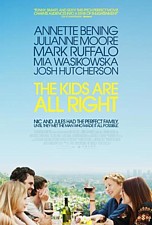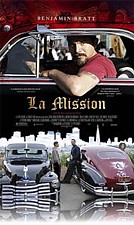
Lisa Cholodenko's return is one of the best movies of the year, Benjamin Bratt shines in a Latino
themed LGBT indie, the dragon tattoo chick is back, girlfriend in tow
themed LGBT indie, the dragon tattoo chick is back, girlfriend in tow
film from a queer perspective
Reviews
| KATM media outlets |
| KATM featured weekly |
| Join Us! |
| KATM on RT |
| Vidcast Starring KATM |
| NOTE: THIS SITE ONLY LOADS CORRECTLY WITH EXPLORER AND MOZILLA BROWSERS - SORRY SAFARI USERS! |
| Buy the KATM Book |
Love Me Some Queer Movies:
The Kids Are All Right-La Mission-The Girl Who Played with Fire (note)
Expanded Edition of 7-7-10 WCT Knight at the Movies column
By Richard Knight, Jr.
The Kids Are All Right-La Mission-The Girl Who Played with Fire (note)
Expanded Edition of 7-7-10 WCT Knight at the Movies column
By Richard Knight, Jr.
| The year of the lesbian movie coalesces in the triumphant The Kids Are All Right, co- writer/director Lisa Cholodenko’s unfussy look at an average family that just happens to have two moms instead of one. How many movies cover all the bases and hit one home run after another as this one does? Kids, which stars Annette Bening, Julianne Moore and Mark Ruffalo, can boast great, nuanced writing, directing, and acting. Not to mention that it’s beautifully, though simply shot and edited, makes judicious use of source music and underscoring, and best – is tremendously entertaining as it expertly walks the fine line between drama and comedy with breathtaking precision. Bening and Moore play Nic and Jules, a long term couple, a doctor and earth mother type, who used a sperm donor to have their two teenage children, 17 year-old Joni (Alice in Wonderland’s Mia Wasikowska) and 15 year-old Laser (Journey to the Center of the Earth’s Josh Hutcherson). As the movie opens it’s the summer before Joni heads off to college. Laser is curious about his biological dad and soon both he and Joni have had a tentative meeting with Paul (Ruffalo), a straight, unattached restaurant owner who is the essence of cool and sexiness (“I love lesbians!” he exclaims when he learns from Joni he’s fathered a child with each woman). “We are so not telling moms,” Joni asserts about the meeting but soon the truth comes out and though everything seems to go well when Paul meets Jules and Nic, complications quickly ensue. Paul has come into their lives at a vulnerable time for all of them and, it turns out, he has come with his own agenda (unbeknownst to him at the time). The relationship between Jules and Nic has already been entering rocky shoals before Paul’s arrival and this new dimension he adds to their lives ultimately challenges and reinforces for all the characters what it means to be a family. Can Nic and Jules love each other enough to allow the other person to change? Out filmmaker Cholodenko (whose previous features include High Art and Laurel Canyon) has worked on and off on her script with writing partner Stuart Blumberg and it shows. The writing is sharp, observant and the scenes are beautifully shaped: the economy and richness in the picnic table scene when Paul comes for his first visit, the glorious monologue that leads to heartbreak when Jules sings the Joni Mitchell song at a later dinner, the beautiful scene in the truck when the teenage Josh questions Paul about his decision to donate sperm, the myriad of bedroom set scenes between Nic and Jules, playful, sensual, filled with unspoken angst – beautiful sequences all. The cliché “it’s all in the details” was never truer than in this lyrical script. And the acting matches up with the words. These are superbly shaped performances helped enormously by Cholodenko and Blumberg’s script (how these actors must have jumped for joy when they read it) and Cholodenko’s astute direction which allows each of the principles multiple moments to shine. There’s no stinting on emotion and when the fireworks (both dramatic and comedic) come they seem to evolve organically (the California settings are also hugely appealing). You don’t question for a second that Moore and Bening are a couple; that Wasikowska and Hutcherson are their kids, that Ruffalo is in the midst of an enormous emotional change. The Kids Are All Right is one of those small cinematic miracles that movie audiences – especially seen it all before film critics like myself – hope and pray for. That it makes a powerful social argument in favor of LGBT families without breaking a sweat in the process is a wonderful bonus as well. Briefly Noted: Noomi Rapace returns as Lisbeth Salander, the kick ass, bisexual, goth computer hacker aka the girl with the dragon tattoo in The Girl Who Played With Fire, part two of the red hot Swedish trilogy series. In round two, yet another sexual crime thriller, Lisbeth’s on the run when she’s set up as a murderer. Her tortured childhood provides clues to a mysterious prostitution ring and in this edition, which again features Mikael Nyqvist as the journalist in league with Lisbeth, we meet her equally tough, kick boxing girlfriend and the film features a very hot lesbian love scene between the two ladies. Subtitled. +++++++++++++++++++++++++++++++++++++++++++++++++++++++++++++++++++++ Many years after I came out to my family there were still, apparently, lingering feelings of loss and disappointment on my father’s part. Though we had never discussed it, I was the only male offspring and he had certainly hoped I’d have a son to carry on the family name. One day while gazing at a photo taken of us with my grandfather, dad began to acknowledge this when he said, “I’d thought maybe there would have been…” before trailing off and adding, “But things went in another direction” before quickly leaving the room. His disappointment was palpable and for a moment I let go of long held anger at having to live under the weight of it. Instead, I allowed myself a glimpse into the perspective of this straight, conservative male inculcated with rigid ideas of masculinity. With a flash I understood his disappointment and recognized the bitter irony of a conservative father’s overwhelming sense of loss at nature’s apparent cruelty – the gift of an only son who turned out to be gay. La Mission, writer-director Peter Bratt’s vibrant sophomore effort, which stars his brother, Latino heartthrob Benjamin Bratt, attempts to explore this subject. It’s a gay coming out story that focuses on the parent rather than the child. Bratt stars as Che Rivera, a single father who has done jail time and now works as a bus driver, raising his teenage son in the heavily Latino populated Mission district of San Francisco. With his macho swagger, dark glasses, tattoo covered torso, and goatee, we know he’s meant to be a tough guy (this is affirmed when Che kicks a cocky gang banger off his bus without throwing so much as a punch). Within a few minutes of screen time we ascertain the physical and mental boundaries of Che’s world within the Mission – his work as a bus driver, his passion for working on vintage cars for his lowrider club; his camaraderie with his pals, fellow members in the club, who he plays cards with and who sass one another. We learn that Che is a recovering alcoholic, an ex-con with a reputation for a violent temper and we see an example of it when he berates a new tenant in his apartment building, Lena (Erika Alexander, in a fiery, likeable performance) who has complained to the landlord that he works on his cars in front of the building. There’s more than a hint that he’s not just pissed off about the complaint but the fact that his beloved neighborhood is gentrifying with outsiders (of which Lena, a no-nonsense African American, clearly is Exhibit Number One). But mostly, we see the pride Che takes in his son Jes (Jeremy Ray Valdez in his screen debut), a high school senior who he’s determined is going to avoid his mistakes. The relationship between the two is solid but lately Jes has been distant and has been blowing off the monthly get together of the lowrider club, preferring to hang out with friends rather than with Papi. “Friends” in this case actually means Jordan (Max Rosenak, also making his feature debut) – Jes’s secret boyfriend who he meets on the down low and who takes him to his first gay bar in the Castro – located just blocks from the Mission but a million miles away culturally. But when dad finds a batch of Polaroids the next morning of Jes and Max taken at the club everything changes. It’s bad enough that Jes is queer but a white boy! Jes is unrepentant but Che will have none of it. “You’re dead to me,” he rails at him, kicking him out of the apartment. Jes moves in with supportive relatives and after a physical altercation with Che when he returns to make amends, finds an unlikely ally in Lena, who confronts Che over his immediate use of violence to handle the situation. She urges Che to step outside his traditional macho views and support his son. Soon, the attraction between the two is evident and a tentative relationship begins. Though family and some friends support Jes it’s also clear the community isn’t exactly ready to embrace the Gay Agenda and as soon as the word is out that Jes is gay those same pesky gang bangers are tagging Che’s garage door with the word “faggot.” We know, having seen this scenario in many after school “problem” specials and other gay indie movies that a confrontation between the homophobes and Jes is inevitable which will lead, naturally, to the dad’s mental transformation. What we don’t see is the inner transformation take place. That’s the conundrum for a character like Che – a character whose inner emotional journey is rarely expressed verbally. Rather, we’re given scenes with Che displaying a lot of angry, self-destructive behavior – he returns to heavy drinking, resorts to violence as a curative, etc. It’s not in Che’s character to discuss his feelings – certainly not feelings about how to deal with acceptance of a gay son – with his close friends and family members. Though Bratt the writer could have taken a short cut – shown us Che’s conversion via a visit to a P- Flag meeting or other support group for example – he stays true to the Che’s character and relies on his brother Benjamin’s acting abilities to pull off a man in deep emotional turmoil without the aid of a verbal exploration – and Benjamin, who brings dignity and depth to a character this side of stereotypical – manages it with a minimum of fuss. Aside from being a “problem” character drama La Mission is also a love letter to the district and as such is seen through Rose Colored Glasses (it’s where both Bratt brothers grew up and where the film was shot). Other than those nasty thugs with their noxious gangsta rap and guns the area seems to be populated with wholesome, friendly “brown people” who honor tradition and community, look out for each other, and bask in the glow of each other’s company. Without the gay plotline, the film could have been shot 30 years ago (and a raft of irresistible Latin soul flavored 70s tunes on the soundtrack add to the sense of nostalgic déjà vu). Even with these quibbles, though, La Mission is an entertaining, sincere effort livened by the magnetic performance of Bratt, aided in no small measure by Alexander as his love interest. Fans of other Latino themed gay dramas, Shelter and Quinceanera, which explore similar thematic terrain, will especially enjoy the film. |






